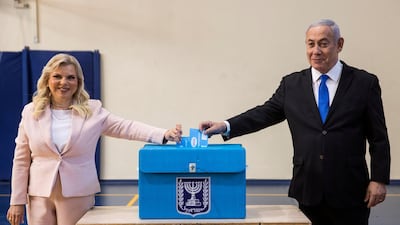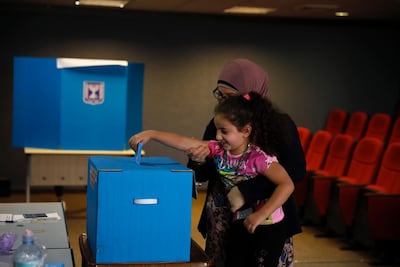Israeli Prime Minister Benjamin Netanyahu’s future remained uncertain after voters went to the polls Tuesday in a tight repeat election seen as a referendum on his rule and the political future of Israel.
The embattled Mr Netanyahu spent the day campaigning around the country to shore up support, warning that Arab, leftist and secular voters were stealing the election.
Initial exit polls showed his Likud party with 31 seats and his main challenger, Blue and White, with 33 seats.
But analysts warned that much could still change as more votes are counted and alliances negotiated.
Likud won the most votes last April’s election, but Mr Netanyahu failed to form a ruling coalition.
After running out of time, he sent the country back to elections to preserve his seat of power.
Despite wide apathy for another election, voter numbers were shown to be up by about 1.5 per cent throughout the day compared to April’s election.
In July, Mr Netanyahu became Israel’s longest-serving prime minister, surpassing founding father David Ben Gurion.
He is beloved by supporters as “King Bibi” and “Mr Security”.
But the leader is facing indictment in three corruption cases, and the public is frustrated over the lavish lifestyle and scandals of his wife, Sara, and son, Yair.
Mr Netanyahu has called the corruption cases a witch-hunt led by the Israeli left and media bent on ousting him.
It is a refrain that plays well with his base, but has also fuelled the country’s deepening polarisation and shift towards the right.
Pre-election polls showed Avidgor Lieberman, the head of Yisrael Beyteynu, possibly gaining more seats than the 10 he won in April.
Mr Lieberman and Mr Netanyahu were allies in the recent past but they are now arch-enemies.
After the last election Mr Lieberman refused to join Likud's coalition because of disagreements over a draft bill to conscript ultra-Orthodox Jews into the military.
Mr Netanyahu sided with the ultra-Orthodox parties, who are a core part of his coalition, and called for new elections.
Despite his own hardline and racist comments about Arabs and the left, this election Mr Lieberman has emerged as an unlikely kingmaker and carrier of the secular torch.
But Mr Netanyahu’s main challenge comes from the newly formed Blue and White Party, a centrist alliance of former generals and a TV personality led by former army chief of staff Benny Gantz.
Blue and White is popular as the main viable alternative to Mr Netanyahu, but it has struggled to define what its government would look like.
This election also brought the return of the Joint List, an alliance of Arab-majority parties that became the third largest in Parliament after the 2015 election but then dissolved in the April election over ideological and personal differences.
One topic of concern this time was claimed cases of voter fraud, which critics said was a tactic by the right to suppress the Arab vote and delegitimise the elections.
In the April election, Likud sent activists with 1,200 hidden cameras to polling stations in Arab communities.
They claimed the move was to prevent voter fraud, despite presenting no evidence of it.
The day after the elections, Kaizler Inbar, a public relations firm led by a prominent settler, took credit for the idea in a Facebook post and credited the cameras with lowering turnout by Arab voters.
After a lawsuit, Israel’s Central Elections Committee, backed by Attorney General Avichai Mandelblit, barred the use of cameras in polling stations.
In response, Likud put up legislation to allow it, but that was blocked by Mr Lieberman.
Mr Netanyahu and party operatives claimed a victory, however, after the committee on Monday barred the left-wing group Zazim from hiring buses to take voters in Bedouin communities to the polls.
About 30 per cent of Israel’s 260,000 Bedouin live in 35 isolated villages that the state does not recognise, so residents must travel up to 50 kilometres to vote elsewhere.
Earlier legal cases to reduce the barriers to voting have also failed.
Last week, Facebook temporarily suspended Mr Netanyahu’s official Facebook page for incitement after a chatbox on it warned that his opponents would form “a secular left-wing, weak government that relies on Arabs who want to destroy us all”.
Mr Netanyahu later claimed that an intern had written the message.
This election has also included increasingly polarised campaigning between Jewish Israelis, pitting the secular left against the religious nationalist right.
On the eve of the last election, Mr Netanyahu announced that he would annex part of the occupied West Bank if re-elected.
He gave more specifics during the current election campaign, pledging to annex the Jordan Valley, which is about a third of the West Bank and includes strategic farming and border areas, if elected again.
The move would leave the 2.5 million Palestinians in the West Bank isolated in different enclaves and surrounded by Israel.
The UN, EU and Arab countries condemned the proposal as an illegal land grab, saying such a move would make a two-state solution impossible.
But Mr Gantz said that Blue and White supported annexation and had come up with the idea first.
A few days later, in another apparent concession to hardliners, Mr Netanyahu held a Cabinet meeting in the occupied West Bank.
Throughout the campaign, Mr Netanyahu has also tried to appeal to voters by touting his relationships with world leaders, including US President Donald Trump and Russian President Vladimir Putin.
Likud, in April and in recent weeks, has put up posters with Mr Netanyahu smiling next to Mr Trump or Mr Putin with the caption, “Another league”.
Before the April election, Mr Trump announced that the US would recognise Israel’s annexation of the occupied Golan Heights, as an electoral favour for Mr Netanyahu.
This time around, the Israeli leader suggested that the US supported his Jordan Valley annexation plan, while Mr Trump tweeted that the two had discussed a possible US defence treaty.
That was despite hesitation from some in Israeli security over such a deal.
In 2015, the Joint List invigorated Arab voters, who reached a high turnout of 63 per cent.
In the April election, one of the factions, Ram-Balad, almost did not make it past the threshold of 3.25 per cent of the vote to enter Parliament.
This election the Joint List has tried to win back the trust of voters by promising to remove Mr Netanyahu and focus on issues of concern to Arab communities.
Top concerns include cancelling the Nation State law, legislation passed last year that effectively classed Arab and non-Jewish citizens as second-tier, and curbing violence and poverty in marginalised and neglected communities.
Initial exit polls showed the Joint List becoming the third largest party in the Parliament.
In one possible scenario, the Joint List could join Blue and White’s coalition to oust Mr Netanyahu, despite the fact that Mr Gantz has so far said he would not form a coalition with Arab parties.
Ayman Odeh, head of the socialist-leaning Hadash party, which is part of the Joint List, recently said it was not in anyone’s pocket.
He said that the day after elections, the group would consider joining a coalition if it supported key demands such as repealing the Nation state law, ending the occupation and addressing Arab communities’ concerns.
“There’s no doubt that the Arab citizens are a major player in these elections,” Mr Odeh said.
He said Arab citizens needed “to do everything to change the government".
Wifa’a Abudhrama, 29, from Beit Sfafa, a Palestinian neighbourhood of Jerusalem split between the east and west sides, voted in this election “to make change".
“I hope to make the Arab community have the same rights as Israelis," Ms Abudhrama said. "I have citizenship but I don't have the same rights as Israelis.”
While many Palestinian citizens were expected to boycott the election, she said she was voting partly for her young daughter’s future.
“I hope that people will look at her like a human, not like an Arab,” Ms Abudhrama said.



